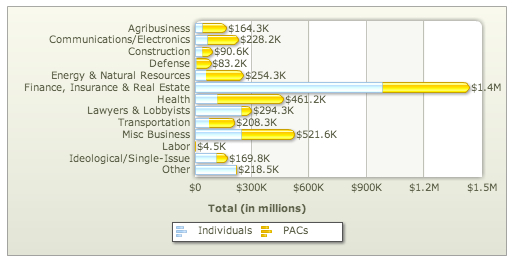Eric Cantor, Boeing, and the GOP's new money problem
Cantor isn't the only loser from his stunning primary defeat


A free daily email with the biggest news stories of the day – and the best features from TheWeek.com
You are now subscribed
Your newsletter sign-up was successful
On Wednesday, following House Majority Leader Eric Cantor's (R-Va.) shocking loss in a Republican primary race, political observers learned that Cantor spent more of his campaign chest at steakhouses ($169,000) than victorious opponent David Brat spent on his entire campaign ($122,000). Financial-markets watchers learned that Boeing's steep, 2.3 percent loss on the New York Stock Exchange was also attributable to Cantor's loss*, making Boeing the "biggest loser" after Cantor, as Guggenheim Securities analyst Chris Krueger explained to Bloomberg News.
What do those two stories have in common? Money, obviously, but also an old proverb ascribed to Jesus: No one can serve two masters. Cantor was apparently unusually skilled in straddling the money-centric camp in his party (Chamber of Commerce, Wall Street, K Street lobbyists) and the ideology-centered wing (Tea Party, social conservatives), but perhaps the most telling explanatory anecdote on why Cantor lost is that on the morning of the primary, he was meeting with well-heeled GOP donors at a Capitol Hill Starbucks.
Politically, Cantor's impressive fundraising prowess and close ties to Wall Street ended up being a liability. But as Politico's Byron Tau notes, Republicans will miss the cash Cantor brought to the party. "I think the party is definitely going to be losing one of its top two fundraisers in the House," GOP consultant and lobbyist Jeff Burton tells Tau. The Center for Responsive Politics (CRP) tallies where that money came from in this most recent electoral cycle:
The Week
Escape your echo chamber. Get the facts behind the news, plus analysis from multiple perspectives.

Sign up for The Week's Free Newsletters
From our morning news briefing to a weekly Good News Newsletter, get the best of The Week delivered directly to your inbox.
From our morning news briefing to a weekly Good News Newsletter, get the best of The Week delivered directly to your inbox.

His top career donor, by far, was the securities and investment industry, at $2.9 million, followed by real estate ($1.9 million) and insurance ($1.5 million). "Cantor enjoyed a strong relationship with business" and "Wall Street especially," says The Washington Post's Jia Lynn Yang. "Cantor went to bat for the industry repeatedly over politically unpopular issues, including the taxation of income at private equity firms at the lower capital gains rate."
Cantor liberally spread his hefty donations around to other GOP candidates — his Every Republican is Crucial PAC was the top contributor to federal candidates in 2006, 2010, and 2014, and in the top three in 2008 and 2012, according to the CRP. Wall Street will miss Cantor. The Chamber of Commerce and Business Roundtable will miss Cantor. His colleagues he shuttled money to will miss him. That's not the GOP's only money problem, though.
Here's how Brat described his victory on Tuesday night: "I will fight to end crony capitalist programs that benefit the rich and powerful." In case the target of that jibe isn't clear, here's what Brat wrote in the Richmond Times-Dispatch last Friday: "I am running against Cantor because he does not represent the citizens of the 7th District, but rather large corporations seeking insider deals, crony bailouts, and a constant supply of low-wage workers."
And here's how he was running against Cantor before that:
A free daily email with the biggest news stories of the day – and the best features from TheWeek.com
That sounds like something a Democrat, or an Occupy Wall Street protester, might run on. The rest of Brat's views on money and politics wouldn't be embraced by most Democrats, but his cri de coeur against "crony capitalism" is a big tenet of Tea Party populism. One of the Tea Party's founding motivations was opposition to TARP, the big bank bailout. This is an inconvenient truth for the GOP.
The Democratic Party also struggles with this tension between the need to raise money and the necessity of serving its populist base (not to mention constituents), but nobody thinks the Democrats are in bed with the Chamber of Commerce (Wall Street is a different matter). And there's no vibrant national Democratic insurgency threatening incumbents with early retirement — at least not yet.
The chilling effects of Cantor's loss on passing immigration reform, raising the debt ceiling, and other hot-button conservative issues has gotten a lot of press since Tuesday night. But the GOP's money problem is arguably a more electorally existential threat: Not only did the national Republican Party lose the millions that Cantor brought to the party directly, but its shaky incumbents discovered the risks of going to bat for the money side of the party.
* Cantor is a big supporter and defender of the U.S. federal Export-Import Bank, which, among its subsidies of U.S. exports helps foreign airlines buy Boeing jets. Lots of them — $10 billion worth, Boeing estimated in May.
Peter has worked as a news and culture writer and editor at The Week since the site's launch in 2008. He covers politics, world affairs, religion and cultural currents. His journalism career began as a copy editor at a financial newswire and has included editorial positions at The New York Times Magazine, Facts on File, and Oregon State University.
